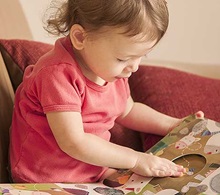 Reading is a perfect way to spend quality time with your children. While helping children to develop essential literacy and reading skills, stories spark children’s imaginations and create memories that last a lifetime. Here are a few simple tips from Barefoot Books for making storytime a memorable and enjoyable experience for families.
Reading is a perfect way to spend quality time with your children. While helping children to develop essential literacy and reading skills, stories spark children’s imaginations and create memories that last a lifetime. Here are a few simple tips from Barefoot Books for making storytime a memorable and enjoyable experience for families.
- Ask your child for book suggestions. Even the youngest of children have preferences in books. Find out your child’s favorite books for storytime and then suggest some of your own from when you were a child. Don’t forget about classic tales and adventures, such as myths and legends about knights and castles. You can also choose to read bilingual stories or stories from around the world as a way for children to experience different languages and cultures.
- Consider your child’s attention span or your family’s schedule. When reading to children, it’s not always necessary to read an entire book. Reading one chapter a night at bedtime or even a few pages at a time will keep your child engaged and excited for the next storytime with you. It also helps build suspense and recall.
- Consider different times of the day to read to your child. Reading time doesn’t always have to be at bedtime. Some families enjoy reading with their children early in the morning as a special way to start the day. Premier Academy promises to provide quality childcare in Omaha and Elkhorn by helping to foster a love of reading in your child all throughout the day.
- Keep your child engaged in reading. Ask questions along the way to help promote speech development and comprehension. Point out words that might be new to their vocabulary and talk about how the words are used and what they mean. Are there far-off lands that are featured in the book? Find them on a map together. At Premier Academy we incorporate books into our weekly theme and curriculum daily. We ask questions that evoke emotion and reflective inquiry, such as, “What would you do in this situation?” “Why do you think the character behaved in that way?” “Have you ever encountered a similar situation?” “Who does the character remind you of?” “How does the character feel?”
- Read aloud together with your child. If you have an experienced reader, rather than reading to your child, try reading with him or her. Ask him or her to read a page aloud and then you read a page. Sharing the story in this way will help you discover new things about each other and elicit dialogue.
- Be creative during storytime. Use your personality to bring children’s books to life. Using different voices for each character or acting out parts of the story can make story time even more memorable and enjoyable for you and your child.
- Find different places to read to children. Under the trees in the evening with a blanket and flashlight; swaying on a hammock; cuddled up on a favorite couch; at the breakfast table; sitting on the front step watching the world go by…a place to read can be just as unique as the stories themselves.
- Continue engaging with books after the last page. Look for creative ways to extend the learning of the book. Some ways to do this may be to do a family craft together based on the illustrations or theme in the story; listen to music that is in some way related to the story; research recipes from where the story is located and cook them together; act out the story with your child; write a sequel to the story together, etc.
- Keep a children’s storytime journal together. It’s never too early to begin teaching children to write. Note the book or story shared, the date, the reactions of other family members. Younger children may wish to draw a picture representing the book. Older children can help complete the journal entry. The journal will become a beautiful memento to look back on the books shared during storytimes together.
- Take pictures of your family reading. There are few things sweeter than pictures of family members curled up listening to stories together. You can use these pictures to illustrate the passage of time as family members grow, tastes in books evolve, or the books become longer as the children grow older.

